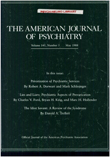Attitude change concerning right to refuse treatment: the impact of experience
Abstract
Forty-three medical students completed questionnaires about their attitudes toward the right to refuse treatment at the beginning and end of their psychiatric clerkship, during which time their clinical experience included exposure to involuntary psychiatric treatment. The students had a more favorable view of involuntary treatment after the clerkship; the change in attitudes was statistically significant. The authors hypothesize that the medical students' increased willingness to use seclusion and involuntary neuroleptic medication was due to exposure to agitated violent patients as well as experience with the beneficial effects of neuroleptic medication.
Access content
To read the fulltext, please use one of the options below to sign in or purchase access.- Personal login
- Institutional Login
- Sign in via OpenAthens
- Register for access
-
Please login/register if you wish to pair your device and check access availability.
Not a subscriber?
PsychiatryOnline subscription options offer access to the DSM-5 library, books, journals, CME, and patient resources. This all-in-one virtual library provides psychiatrists and mental health professionals with key resources for diagnosis, treatment, research, and professional development.
Need more help? PsychiatryOnline Customer Service may be reached by emailing [email protected] or by calling 800-368-5777 (in the U.S.) or 703-907-7322 (outside the U.S.).



